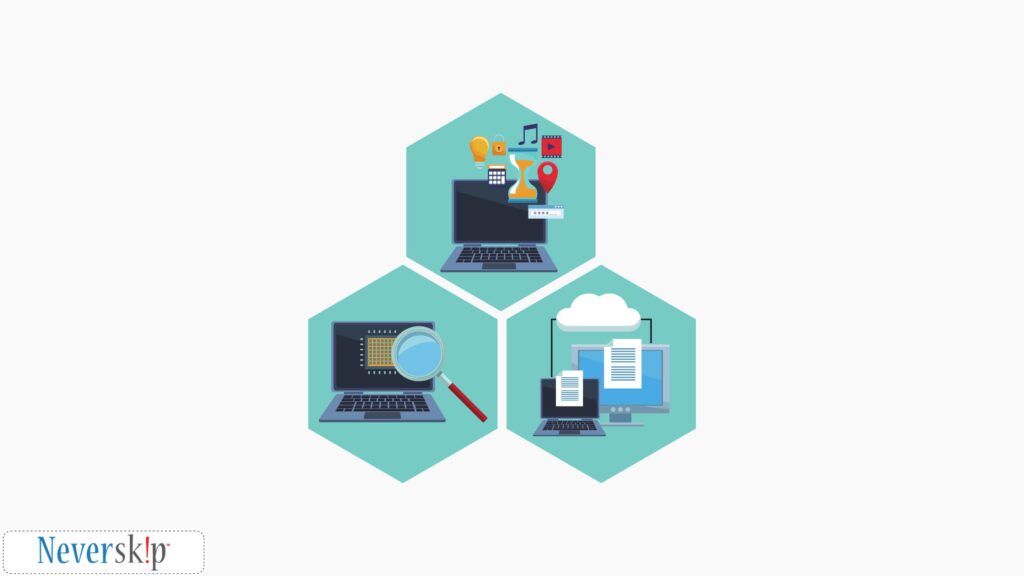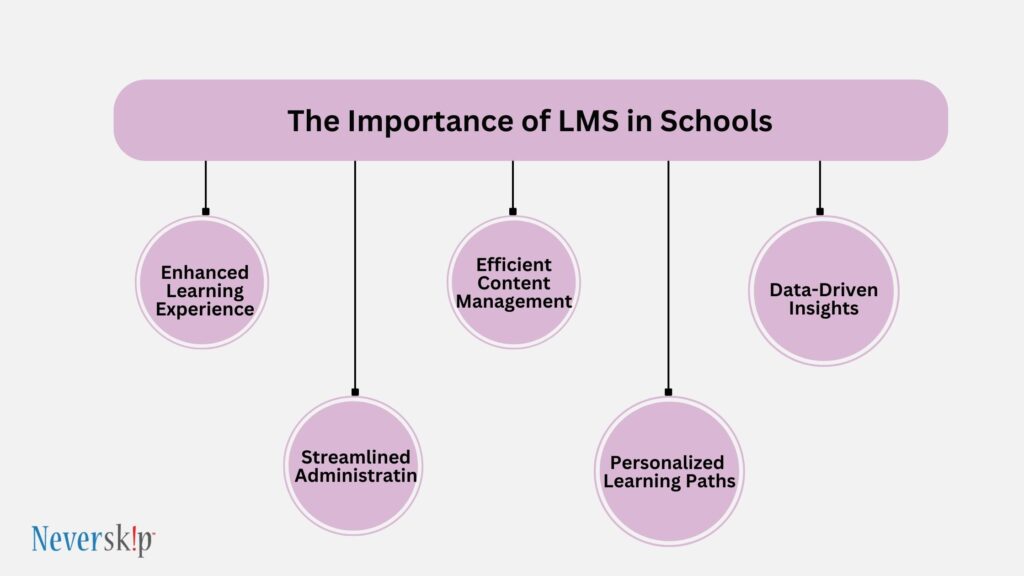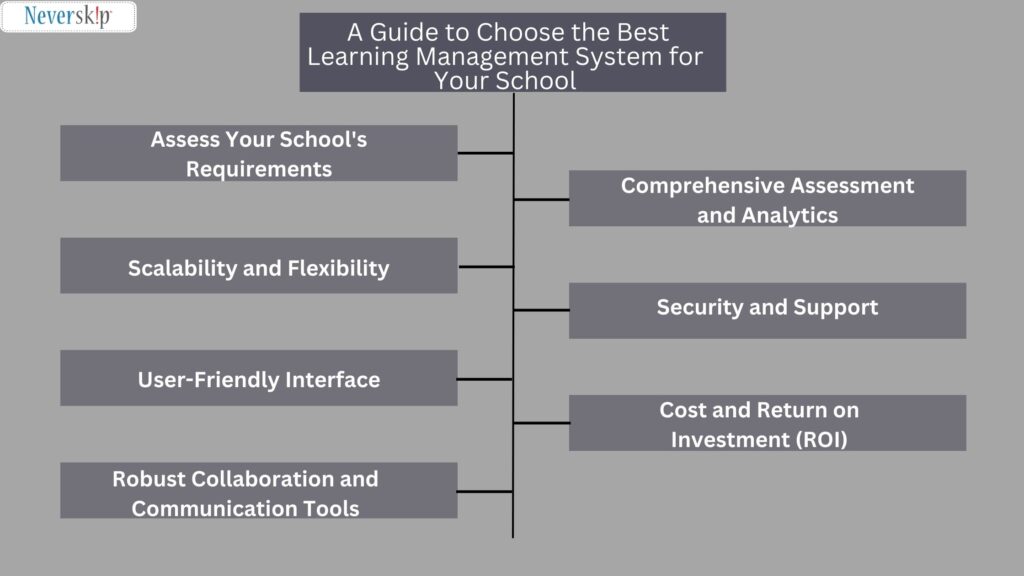In the fast-paced and fiercely competitive modern education sector, Learning Management Systems (LMS) have emerged as indispensable tools, revolutionizing the way schools impart knowledge.
As per the recent statistics, there are nearly 73.8 million LMS users around the globe and the education sector is a significant contributor to this number. As the demand for efficient, interactive, and organized learning experiences grows, the choice of the right LMS becomes paramount.
These systems have swiftly evolved from being optional to essential, fostering engagement, collaboration, and seamless administration. The quest to choose the best-fit LMS for your school isn’t merely a choice; it’s a strategic decision that holds the potential to reshape the educational landscape and elevate the teaching and learning experience to new heights. And to ease your task, in this blog, we will guide you through how to choose the best LMS for your school.
What Is a Learning Management System for School?

A Learning Management System for schools is a comprehensive digital platform designed to facilitate the management, delivery, and tracking of educational content and activities within an educational institution. It serves as a centralized hub where teachers, students, administrators, and parents can interact and engage in various aspects of the learning process.
The primary objective of an LMS is to enhance and streamline the teaching and learning experience by providing a structured framework for online courses, resources, assignments, assessments, and communication.
Why Is a Learning Management System Crucial for Your School?

An LMS transcends the traditional boundaries of education, offering a plethora of benefits that enhance teaching, learning, administration, and engagement. Here are top compelling reasons why a Learning Management System is crucial for your school:
1. Enhanced Learning Experience
A key advantage of an LMS is its ability to transform the learning experience. By providing an online platform for course content, multimedia resources, and interactive activities, students gain access to a dynamic and engaging learning environment.
The LMS supports various learning styles, enabling educators to incorporate multimedia, quizzes, discussion boards, and assignments that cater to diverse student preferences. As a result, students can learn at their own pace, revisit materials, and engage in collaborative activities, ultimately fostering deeper understanding and knowledge retention.
2. Efficient Content Management
An LMS serves as a centralized repository for all educational content. Educators can organize course materials, presentations, videos, and assessments in a structured manner, making it easier for students to access resources and stay organized.
The system allows for easy updates and modifications, ensuring that content remains up-to-date and aligned with curriculum objectives. Additionally, educators can reuse or adapt content for future courses, optimizing time and effort.
3. Streamlined Administration
Administrators juggle various tasks, from managing student records to coordinating schedules and resources. An LMS streamlines these administrative processes by providing tools to automate tasks such as enrollment, grade tracking, attendance management, and communication.
This reduces manual workload, enhances accuracy, and offers a holistic view of student progress. Furthermore, the LMS facilitates communication between administrators, educators, students, and parents, fostering a collaborative ecosystem that nurtures a sense of community within the school.
4. Personalized Learning Paths
Every student is unique, with distinct learning preferences and abilities. An LMS empowers educators to create personalized learning paths for each student. By offering adaptive assessments and individualized assignments, the system tailors learning experiences to match students’ strengths and areas that require improvement.
This approach helps students build confidence, address learning gaps, and achieve their academic potential.
5. Data-Driven Insights
Educational decision-making is increasingly reliant on data-driven insights. An LMS provides educators and administrators with valuable analytics that offer deep insights into student performance, engagement levels, and learning behaviors.
These insights enable timely interventions for struggling students, identify effective teaching strategies, and facilitate evidence-based improvements to instructional methods. Moreover, educators can monitor the effectiveness of online courses, track student progress, and adjust instructional strategies accordingly.
Also Read: Key Features To Look For In An Exam Management System
A Guide to Choose the Best Learning Management System for Your School

In the realm of modern education, where technology seamlessly intertwines with pedagogy, choosing the right Learning Management System has become a pivotal decision for schools. With a myriad of options available, each promising innovative features and transformative experiences, the task of selecting the best-fit LMS can be overwhelming.
So, here are the top essential factors to consider when choosing an LMS for your school, ensuring a well-informed decision that aligns with your educational goals and values.
1. Assess Your School’s Requirements
Before embarking on the LMS selection journey, take the time to comprehensively assess your school’s unique needs. Engage educators, administrators, and IT personnel to identify the challenges and opportunities your institution faces.
Determine whether you need features for online course delivery, multimedia content management, assessment tools, communication capabilities, or other specific functionalities. This initial assessment will serve as a foundation for evaluating LMS options that cater to your school’s requirements.
2. Scalability and Flexibility
The ideal LMS should be scalable to accommodate both the current and future needs of your school. Consider factors such as the number of students, courses, and educators, as well as potential growth.
Additionally, look for an LMS that offers flexibility in terms of customization. The system should allow you to adapt to changing pedagogical approaches and incorporate your school’s branding elements seamlessly.
3. User-Friendly Interface
An LMS should simplify, not complicate, the teaching and learning experience. Prioritize platforms with intuitive user interfaces that are easy for both educators and students to navigate. Complex interfaces can hinder adoption and create unnecessary barriers.
Look for features such as drag-and-drop course creation, straightforward content uploading, and clear navigation menus that foster a positive user experience.
4. Robust Collaboration and Communication Tools
Effective communication and collaboration are essential components of successful education. Choose an LMS that offers a suite of communication tools, including discussion boards, messaging systems, and announcement features.
These tools facilitate meaningful interactions between educators, students, and even parents, fostering better student engagement and interaction, teamwork, and a sense of community within the school.
5. Comprehensive Assessment and Analytics
Assessment is a cornerstone of education, and your chosen LMS should provide robust tools for creating and administering assessments, quizzes, and assignments. Look for features that support various question types, adaptive assessments, and customizable grading options.
Moreover, analytics capabilities are crucial for monitoring student performance, tracking engagement, and evaluating the effectiveness of teaching strategies. The LMS should offer insights that guide educators in making data-driven decisions. This is also crucial to boost student performance.
6. Security and Support
The security of student data and the LMS’s overall stability are non-negotiable aspects. Ensure that the LMS adheres to industry standards for data security, encryption, and compliance with relevant data protection regulations.
Additionally, evaluate the vendor’s reputation for reliability and customer support. Robust technical support and training resources are essential for ensuring a smooth implementation and addressing any issues that may arise.
7. Cost and Return on Investment (ROI)
While cost is a critical consideration, it should be evaluated in the context of the LMS’s potential ROI. Consider the long-term benefits the chosen LMS offers in terms of improved teaching efficiency, enhanced learning outcomes, and administrative streamlining.
Balance the initial investment with the long-term value the LMS will bring to your school community.
See More: How To Maximize School Resources With School Management Software?

Get Started With a Powerful LMS: Neverskip Learning Management System
In the digital age of education, harnessing the capabilities of a robust Learning Management System has become imperative for schools seeking to provide seamless and effective learning experiences.
As institutions transition toward blended and online learning, the right LMS becomes a cornerstone for engaging students, streamlining administration, and achieving educational goals.
Neverskip Learning Management System stands out as a comprehensive solution that addresses these critical needs, offering an array of features designed to enhance the teaching and learning journey.
Neverskip’s LMS offers a suite of key features that propel education into the digital frontier:
- Blended Learning Solution: Neverskip’s LMS seamlessly integrates both traditional classroom instruction and online learning, fostering a dynamic blend that caters to diverse learning styles.
- Seamless Virtual Platforms Creation: The system empowers educators to effortlessly create virtual classrooms and platforms, ensuring a smooth transition to online learning environments.
- Extensive Content Library: Neverskip provides access to an extensive content library, enabling educators to curate and deliver a rich variety of resources that cater to different subjects and age groups.
- Easy Assignment Management: Educators can efficiently create, distribute, and manage assignments within the LMS, facilitating streamlined assessment processes and timely feedback.
- Interactive Quizzes and Assessments: The LMS offers tools for designing interactive quizzes and assessments, enhancing student engagement and providing insights into learning progress.
- Collaborative Discussion Boards: Neverskip encourages collaborative learning through discussion boards, enabling students to engage in meaningful conversations and share insights with peers.
In a world where education is evolving at an unprecedented pace, adopting an LMS is more than an option—it’s a strategic imperative. Neverskip’s Learning Management System offers a comprehensive solution that caters to the evolving needs of modern education, empowering schools to navigate the challenges of online and blended learning while optimizing teaching and learning outcomes.
With its powerful features, Neverskip’s LMS is not just a tool, but a transformative force that brings education to the forefront of the digital revolution.
Take a free demo today to try it firsthand.







